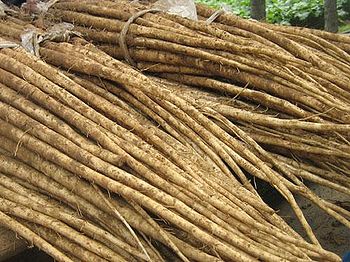Difference between revisions of "Burdock Root"
(→Main Combinations) |
(→Main Combinations) |
||
| Line 35: | Line 35: | ||
* Contains [[Inulin]] prebiotic. | * Contains [[Inulin]] prebiotic. | ||
==Main Combinations== | ==Main Combinations== | ||
| − | * Acne, Boils | + | * Acne, Boils : Burdock Root + [[Wild Pansy]] + [[Brewer's Yeast]] |
==Used in Patent Medicines== | ==Used in Patent Medicines== | ||
Latest revision as of 08:13, 4 January 2022
Other names : Lappa. Fox's Clote. Thorny Burr. Beggar's Buttons. Cockle Buttons. Love Leaves. Philanthropium. Personata. Happy Major. Clot-Bur.
See also :
Burdock, scientific name Arctium lappa, is a large perennial thistle plant that can grow as high as nine feet. Native to Europe and Asia, it was introduced to North America by the early settlers. It belongs to the daisy family; its folk names include beggar's buttons, cockleburr, bardana and fox's clote. In Japan, its sweet-tasting root is used in foods as well as in herbal preparations. Burdock has been used for hundreds of years as a blood cleanser and purifier. Be sure to discuss using burdock with your healthcare provider before taking it. Burdock has large green leaves and a rounded head of purple flowers surrounded by a prickly casing that sticks to any who pass close by. Burdock's deep primary root and underground stems, called rhizomes, are harvested along with the seeds to make herbal preparations. The less potent leaves are used to make herbal teas. The plant contains numerous beneficial compounds. According to AltMD, the roots yield up to 45 percent inulin, along with volatile oils, flavonoids and essential fatty acids.
Contents
Special Precautions of Burdock Root
- Do not take burdock if you are diabetic or if you are pregnant or breast-feeding, taking other diuretic medication, undergoing chemotherapy or taking other anti-cancer drugs.
- Although there is no recommended dosage for burdock, it is considered to be safe when taken in the typical dosage of 2 g of root, according to Drugs.com.
- Side effects include nausea and diarrhea.
- Taking burdock in large doses can deplete potassium levels and cause dehydration due to its diuretic effects.
- Allergy : People who are allergic to certain plants, such as ragweed, daises or chrysanthemums, may also be allergic to burdock root, the University of Maryland Medical Center warns. Improper use of this supplement by hypersensitive people may induce a potentially life-threatening allergic reaction called anaphylaxis. Seek immediate medical attention if you exhibit symptoms of an allergic reaction, such as hives, shortness of breath, difficulty swallowing, facial swelling, weakness or dizziness.
- Belladonna, a poisonous plant, if often mistaken for burdock in the wild, so don't gather your own; only buy burdock products from a reputable manufacturer.
- Burdock Root Tea Poisoning : If you consume burdock root as a tea tincture, you may be at risk of experiencing side effects of burdock root tea poisoning. This side effect occurs infrequently, but it may cause seizures, flushing, dry mouth, skin rash, poor coordination, drowsiness, restlessness, vision alterations, headache pain, slurred or incoherent speech or fever, Drugs.com warns. Consult your doctor immediately if you develop one or more of these side effects after ingesting burdock root tea.
The benefits of Burdock Root are
- Burdock is used as a tonic for its immune-strengthening capabilities.
- Burdock purges chemicals to purify blood. Noted health expert Varro E. Tyler, Ph.D., in The Honest Herbal recommends burdock as a blood purifier, because this remarkable herb has the uncanny ability to help neutralize chemicals that enter the liver. What’s more, it can soothe kidneys and promote normal urine flow. It has been used for centuries as a diuretic and to clear the blood of toxins by stimulating perspiration.
- topically, it is used to relieve certain skin conditions, such as psoriasis, acne and eczema.
- to lower blood sugar
- to treat digestive troubles
- minor skin infections
- colds
- sore throat
- flu
- HIV
- rheumatoid arthritis
- to stimulate bile production.
- Cancer : Historically, burdock has also been used to treat cancer. There have not been many studies performed on burdock, so evidence of its effectiveness is mostly anecdotal.
- Essiac Tea for Cancer. In the 1920s, nurse Rene Caisse marketed a cancer-fighting herbal preparation containing burdock that was based on a traditional Ojibwa medicine. The exact formula remains secret, but contains burdock, slippery elm, sheep sorrel and Turkish rhubarb. Taken in a tea, it continues to be used as an alternative anti-cancer remedy. The National Cancer Institute states that several reputable scientific studies have found no proof that Essiac is effective in slowing or stopping the growth of cancer cells, and it has not been approved by the FDA as a drug. Consult your doctor before using Essiac or burdock for cancer.
- Skin cancer : See : Escharotic salves
- Contains Inulin prebiotic.
Main Combinations
- Acne, Boils : Burdock Root + Wild Pansy + Brewer's Yeast
